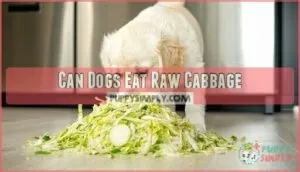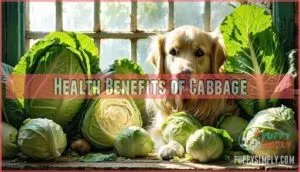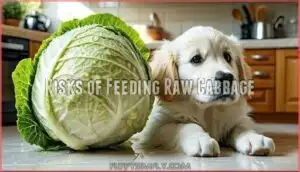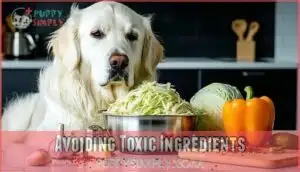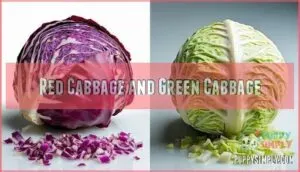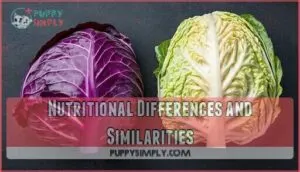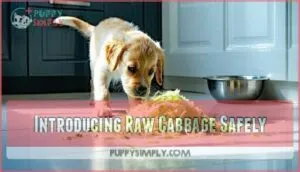This site is supported by our readers. We may earn a commission, at no cost to you, if you purchase through links.
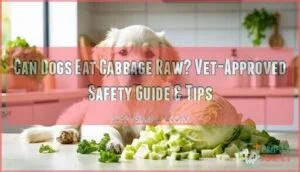
However, it can cause gas and digestive upset if given in large amounts. Veterinarians recommend limiting portions to about a tablespoon daily for most dogs.
Cooked cabbage is easier to digest than raw, but both are safe when properly prepared. Always introduce new foods gradually and watch for stomach upset.
Remove any tough stems and chop into small, manageable pieces to prevent choking. While raw cabbage won’t harm your pup in small quantities, there are important preparation methods and warning signs every dog owner should know, especially regarding digestive upset and the need for proper preparation.
Table Of Contents
- Key Takeaways
- Raw Cabbage for Dogs
- Can Dogs Eat Raw Cabbage
- Health Benefits of Cabbage
- Risks of Feeding Raw Cabbage
- Safe Cabbage Preparation
- Types of Cabbage for Dogs
- Introducing Raw Cabbage Safely
- Frequently Asked Questions (FAQs)
- What happens if a dog eats too much cabbage?
- Can puppies eat cabbage?
- Can dogs eat purple cabbage raw?
- Can dogs eat red cabbage?
- How much cabbage should a dog eat?
- Can dogs eat Chinese cabbage?
- What is the best vegetable for dogs?
- Can a dog eat a whole head of cabbage?
- How much raw cabbage can dogs eat daily?
- What age can puppies start eating raw cabbage?
- Conclusion
Key Takeaways
- You can safely feed your dog raw cabbage in small amounts – start with just a tablespoon daily and watch for digestive upset or excessive gas production.
- Always prepare raw cabbage properly – wash thoroughly, remove tough stems and cores, then chop into small pieces to prevent choking hazards.
- Monitor your dog for adverse reactions – watch for signs like bloating, diarrhea, vomiting, or behavioral changes, especially when introducing cabbage for the first time.
- Consult your veterinarian before adding raw cabbage – some dogs with thyroid issues, digestive sensitivities, or certain medications shouldn’t eat cabbage at all.
Raw Cabbage for Dogs
Raw cabbage can be a healthy addition to your dog’s diet when prepared correctly and given in moderation.
However, it’s harder to digest than cooked cabbage and may cause gas or stomach upset in some dogs, so start with small amounts to test your pet’s tolerance.
Nutritional Benefits of Raw Cabbage
Regarding raw cabbage for dogs, you’re looking at a nutritional powerhouse that packs impressive vitamin retention and mineral bioavailability.
Raw cabbage maintains its full enzyme activity, delivering maximum fiber benefits and antioxidant power.
This cruciferous vegetable offers substantial cabbage benefits dogs can tap into, including high levels of vitamins C and K, plus essential minerals like potassium and calcium that support your dog’s overall health.
Cabbage also has potential anticancer properties due to its anthocyanin and glucosinolate content.
Potential Risks of Feeding Raw Cabbage
While raw cabbage for dogs offers nutritional benefits, it brings several concerns worth considering.
Raw cabbage can trigger digestive irritation in sensitive stomachs, leading to uncomfortable gas in dogs and potential bloat in dogs.
Cabbage is also a source of essential vitamins and minerals, contributing to overall health.
Key risks include:
- Digestive Irritation – High fiber content causes gas and stomach upset
- Thyroid Interference – Goitrogenic compounds may affect thyroid function with excessive consumption
- Choking Hazard – Dense, fibrous leaves pose swallowing risks for smaller breeds.
These cabbage side effects can impact nutrient absorption and overall dog digestion, making moderation essential.
Preparing Raw Cabbage for Dogs
Proper cabbage preparation for dogs requires careful attention to safety and your pet’s digestive needs. Start by washing cabbage thoroughly to remove dirt and pesticides. Remove the tough stem and core before cutting techniques involve dicing into small, bite-sized pieces to prevent choking hazards.
| Preparation Step | Guidelines |
|---|---|
| Washing Cabbage | Rinse thoroughly under cold water, remove outer leaves |
| Cutting Techniques | Dice into ¼-inch pieces, remove core and stem |
| Serving Size | Start with 1-2 small pieces for small dogs |
| Gradual Introduction | Introduce over 3-5 days, watch for reactions |
| Monitoring Stool | Check for changes in consistency or frequency |
Raw cabbage for dogs requires gradual introduction to prevent digestive upset. Begin with tiny amounts mixed into regular food, then slowly increase if your dog tolerates it well. Consider specialized tool options for preparing cabbage. Monitor your pet’s response closely, as some dogs experience gas or stomach discomfort from dog-safe vegetables like cabbage.
Can Dogs Eat Raw Cabbage
Yes, dogs can eat raw cabbage safely in small amounts.
This cruciferous vegetable offers nutritional benefits when prepared properly for your furry friend.
However, quantity matters substantially – too much raw cabbage can cause digestive upset and excessive gas production.
Some dogs show breed sensitivity or cabbage allergies, making gradual introduction essential.
Raw vs cooked cabbage presents different challenges, with raw being harder to digest.
Always dice raw cabbage into tiny pieces to prevent choking hazards.
Consider cabbage alternatives like carrots or green beans if your dog experiences stomach issues.
Monitor your pet’s response when adding any new vegetables for dogs to their diet, and remember that raw cabbage can be a challenge, so gradual introduction is key to prevent digestive upset and ensure your dog can eat it safely in small amounts with proper preparation to offer nutritional benefits.
Health Benefits of Cabbage
Raw cabbage offers your dog several nutritional benefits when fed in moderation.
This crunchy vegetable packs vitamins C and K, fiber, and antioxidants that can support your pet’s overall health and digestion.
Vitamins and Minerals in Cabbage
Cabbage packs a nutritional punch for your furry friend.
This leafy vegetable delivers essential Vitamin K for proper blood clotting and bone health, while Vitamin C supports immune function.
Beta-carotene promotes eye health, and various minerals aid overall dog nutrition.
The cabbage nutritional value includes these vitamins and minerals that contribute to your dog’s health benefits when fed appropriately.
Antioxidants and Fiber Content
Antioxidant powerhouses in cabbage work like tiny shields protecting your dog’s cells from damage.
These cabbage nutrients pack impressive fiber content that supports gut health, though supplementation needs vary by individual dog.
Key antioxidant benefits include:
- Vitamin C boosts immune function naturally
- Beta-carotene promotes healthy vision and skin
- Anti-inflammatory compounds reduce cellular stress
The fiber in cabbage aids digestion but requires gradual introduction to your dog’s diet, supporting overall gut health.
Supporting Digestive Health
When your dog needs better digestion, fiber benefits from raw cabbage can work wonders.
This cruciferous vegetable supports healthy gut bacteria and promotes consistent stool formation.
The natural fiber content aids enzyme production while helping prevent dangerous bloat.
However, introduce raw cabbage gradually since excessive fiber for dogs can trigger uncomfortable gas production, disrupting your pet’s digestive harmony.
Risks of Feeding Raw Cabbage
While raw cabbage offers nutritional benefits for dogs, it comes with several important risks you should know about.
Raw cabbage is harder to digest than cooked cabbage and can cause more gas, bloating, and stomach upset in your furry friend, which is a significant consideration for raw cabbage consumption.
Gas Production and Digestive Issues
Why does raw cabbage turn your dog’s belly into a gas factory? The high fiber content and natural compounds in raw cabbage can overwhelm your pet’s digestive system, especially if they haven’t eaten it before.
- Fiber Overload: Raw cabbage’s tough fibers challenge sensitive stomachs, causing uncomfortable bloating and excessive gas production
- Bloat Risk: Large breeds face serious complications when gut bacteria struggle to process sudden dietary changes from raw cabbage
- Gradual Introduction: Start with tiny amounts to help your dog’s digestion adapt without shocking their system. Remember that cabbage contains thiocyanate that affects thyroid function, so moderation is key.
Thyroid Function and Hypothyroidism
Beyond gas troubles, raw cabbage poses thyroid function risks for your dog.
Goitrogen effects from excessive cabbage quantity can interfere with thyroid hormone production, potentially triggering hypothyroidism.
Dogs with iodine deficiency face higher risks, and certain breed predisposition factors may increase susceptibility, making raw cabbage a concern for dogs on thyroid medications.
Choking Hazards and Intestinal Blockage
Large chunks of raw cabbage create serious choking hazards for dogs.
Dense, leathery leaves can get lodged in your pet’s throat or cause digestive obstruction when swallowed whole.
- Piece Size: Cut cabbage into small, manageable pieces to prevent swallowing difficulty
- Breed Predisposition: Smaller dogs face higher risks due to narrower airways and digestive tracts
- Emergency Intervention: Watch for signs like pawing at mouth, difficulty breathing, or repeated vomiting
Safe Cabbage Preparation
When you prepare cabbage for your dog, the cooking method makes all the difference between a safe treat and a potential problem.
Always steam or boil plain cabbage without any seasonings, oils, or toxic ingredients like onions and garlic that can harm your pet.
Cooking Methods for Cabbage
When cooking cabbage for your dog’s diet, steaming cabbage stands out as the gentlest method that preserves nutrients while making it easier to digest.
Boiling benefits include softening tough fibers, but don’t overcook or you’ll lose valuable vitamins. Roasting cabbage creates a sweeter flavor many dogs prefer, though it takes longer than other methods.
Microwaving cabbage works quickly for small portions, using minimal water to retain nutrients. Skip cabbage fermentation, as fermented foods can upset sensitive stomachs.
For ideal steaming, consider using a specialized steaming device. Choose plain water for boiling or light steaming over raw cabbage to reduce gas production.
Cooked cabbage integrates better into any dog diet than tough raw leaves, making it a good choice for a dog’s diet with minimal water.
Avoiding Toxic Ingredients
When preparing cabbage for your dog, steer clear of ingredients that spell trouble.
Never add seasonings or cooking fats that can transform this healthy vegetable into a dangerous meal.
Keep these toxic additions off your dog’s plate:
- Garlic dangers and onion toxicity – Both contain compounds that damage red blood cells
- Butter concerns and excess fats – Can trigger pancreatitis in sensitive dogs
- Salt risks and spice avoidance – Excessive sodium strains kidneys and organs
Plain, unseasoned cabbage prevents cabbage toxicity dogs might experience from contaminated preparations.
While cabbage itself doesn’t cause toxic foods dogs reactions, additives do.
Remember that dog gas production from cabbage is normal, but seasoned versions increase dog bloat risks.
Bell peppers, however, are safe and can offer nutritional benefits.
The thiocyanate in cabbage poses minimal threat compared to dangerous seasonings.
Types of Cabbage for Dogs
Not all cabbage varieties are the same in regards to feeding your dog. Each type offers different nutritional benefits and flavors that might appeal to your pup’s taste preferences.
Red Cabbage and Green Cabbage
Both red and green cabbage are safe for dogs when prepared properly.
Red cabbage contains more anthocyanins and nutrients, while green cabbage has higher water content.
Dogs often prefer green cabbage’s milder taste over red cabbage’s slightly bitter flavor.
Both varieties offer similar health benefits and can be fed raw in small amounts as dogsafe vegetables.
However, be mindful that cabbage may cause gas in some dogs, which can be a significant consideration for dog owners who want to provide their pets with safe vegetables.
Chinese Cabbage and Savoy Cabbage
Chinese cabbage, also known as Napa cabbage, offers unique Napa Benefits for dogs with its milder taste and softer texture.
This Taste Preference makes it more appealing to picky eaters compared to regular cabbage.
Savoy Nutrients include higher vitamin A content, while both varieties provide excellent dogsafe vegetables options.
The Digestibility Comparison shows Chinese cabbage causes less gas production.
Preparation Differences are minimal – both can be served raw cabbage to dogs when properly chopped for dog nutrition and dog health.
Nutritional Differences and Similarities
While all cabbage varieties share similar nutritional foundations, you’ll find meaningful differences that matter for your dog’s health.
Red cabbage packs more vitamins and antioxidants than green, while Chinese cabbage offers gentler fiber content.
Key nutritional comparisons for dogs:
- Vitamin variations – Red cabbage delivers 56% more vitamin C and 10 times the beta-carotene of green varieties
- Mineral content – Red contains higher potassium (243mg vs 170mg) and magnesium levels than green cabbage
- Antioxidant levels – Red’s anthocyanins provide superior free-radical protection, though all types offer beneficial nutrients
Introducing Raw Cabbage Safely
When introducing raw cabbage to your dog’s diet, you’ll want to start with tiny amounts and watch closely for any digestive upset or excessive gas.
It’s smart to check with your vet first, especially if your dog has a sensitive stomach or any health conditions that might make raw vegetables problematic.
Monitoring for Adverse Reactions
After introducing any type of cabbage to your dog’s diet, you’ll need to watch for signs that their body isn’t handling it well.
Keep an eye out for digestive discomfort like excessive gas, bloating, or stomach gurgling within the first few hours. Stool changes are common red flags – watch for loose stools, dog diarrhea, or unusually firm bowel movements.
Some dogs may experience dog vomiting or show signs of nausea like drooling or loss of appetite. Allergic reactions can manifest as skin irritation, itching, or swelling around the face.
Behavioral changes like restlessness, whining, or reluctance to eat might indicate an adverse reaction. If you notice any concerning symptoms, stop feeding cabbage immediately and schedule a veterinary checkup to rule out allergies or other complications.
You may want to think about a dog’s digestive support if your dog is experiencing issues with their digestive system, which could be a sign of a more serious health problem.
Consulting a Veterinarian for Guidance
Before making dietary changes, your veterinarian provides the safety net every responsible pet owner needs.
They’ll assess breed predispositions and underlying conditions that might make raw cabbage risky for your specific dog.
Here’s why veterinary advice matters:
- Thyroid concerns – Some dogs can’t handle cabbage’s natural compounds
- Digestive sensitivities – Your vet knows your dog’s stomach history
- Medication interactions – Certain drugs don’t mix well with new foods
- Portion guidance – Professional recommendations prevent overfeeding
Your vet offers personalized advice adapted to your dog’s health profile.
They’ll address specific concerns about dog health concerns and provide dog dietary consultation that generic advice can’t match.
This dog veterinarian advice guarantees safe introduction.
Frequently Asked Questions (FAQs)
What happens if a dog eats too much cabbage?
Too much cabbage can spell trouble for your pup—what starts as healthy snacking quickly turns into digestive chaos.
Your dog may experience excessive gas, bloating, diarrhea, and stomach upset from overconsumption.
Can puppies eat cabbage?
You shouldn’t feed puppies cabbage until they’re fully grown. Their digestive systems are still developing, making them more sensitive to gas and potential stomach upset from cabbage’s fiber content.
Can dogs eat purple cabbage raw?
Red cabbage contains 36% more vitamin C than green cabbage, making it nutritionally superior.
You can feed your dog purple cabbage raw, but it’s harder to digest and may cause gas.
Dice it finely to prevent choking and introduce gradually.
Can dogs eat red cabbage?
Yes, dogs can eat red cabbage safely in small amounts. It’s packed with vitamins and antioxidants but can cause gas. Always introduce gradually and avoid seasonings like garlic or onions.
How much cabbage should a dog eat?
Like seasoning soup, cabbage should be sprinkled sparingly into your dog’s diet.
Limit cabbage to less than 10% of their daily food intake, starting with small pieces to test tolerance and prevent digestive upset, with cabbage being the key ingredient to monitor.
Can dogs eat Chinese cabbage?
Chinese cabbage (Napa cabbage) is safe for dogs and often preferred since it’s less bitter than regular cabbage.
You’ll want to introduce it gradually and serve it plain without seasonings to avoid digestive upset.
What is the best vegetable for dogs?
Though you might worry about choosing wrong, carrots are typically the safest vegetable for dogs. They’re low-calorie, packed with vitamins, easy to digest, and most dogs love their sweet crunch.
Can a dog eat a whole head of cabbage?
No, don’t let your dog eat a whole head of cabbage.
This massive amount would cause severe digestive upset, excessive gas, and potentially dangerous bloating, especially in larger breeds prone to stomach issues.
How much raw cabbage can dogs eat daily?
Daily doses demand deliberate decisions – you shouldn’t feed your dog more than a few small pieces of raw cabbage daily.
This cruciferous veggie can cause gas and digestive upset, so start tiny and watch for reactions.
What age can puppies start eating raw cabbage?
Puppies shouldn’t eat raw cabbage until they reach their breed’s full height and weight requirements.
You’ll want to wait until your puppy is fully grown before introducing raw cabbage to avoid digestive issues.
Conclusion
Looking at this dietary consideration more delicately, you can safely offer your canine companion raw cabbage in modest portions.
Remember that "can dogs eat cabbage raw" has a qualified yes – small amounts provide beneficial nutrients without harmful effects.
Start with tiny pieces and observe your dog’s digestive response carefully. Remove tough stems and chop thoroughly to prevent choking incidents.
If you notice excessive gas production or stomach upset, discontinue feeding immediately. Always consult your veterinarian before introducing new foods, especially if your dog has existing health conditions or sensitivities.
- https://vetnutrition.tufts.edu/2018/04/the-a-b-cs-of-vitamin-c/
- https://www.google.com/search?q=vegetable+site%3AAkc.org&oq=vegetable+site%3AAkc.org&aqs=chrome..69i57.2159j0j4&sourceid=chrome&ie=UTF-8
- https://www.nutritionvalue.org/Cabbage%2C_raw_nutritional_value.html
- https://fdc.nal.usda.gov/fdc-app.html
- https://cdn.agclassroom.org/media/uploads/LP875/cabbage_nutrition_facts.pdf

